I aged 40 years in five minutes and went for the hardest run of my life
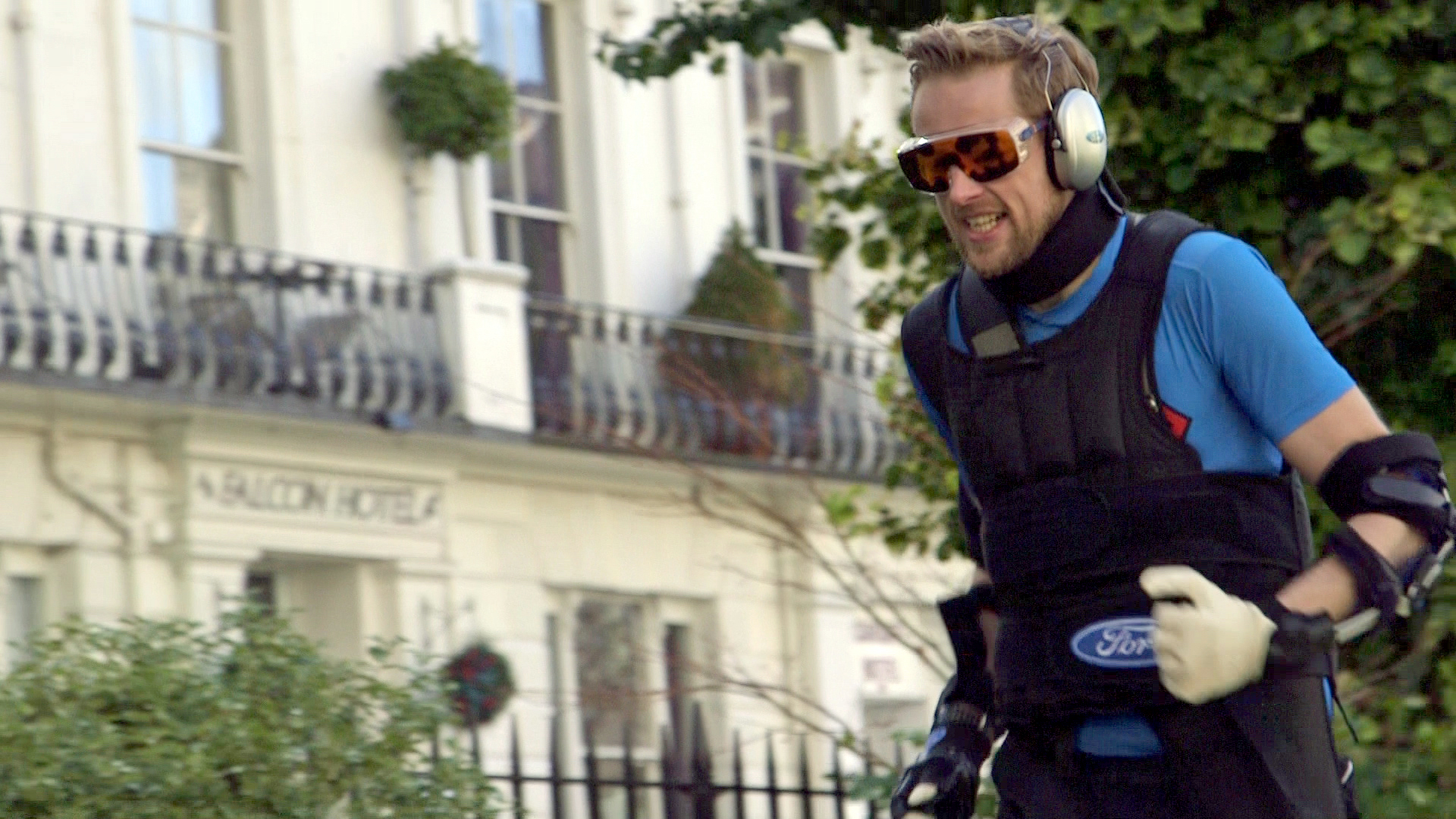
I've just sat down having spent an hour as a 75-year old man. As a 32-year-old, that's pretty disconcerting.
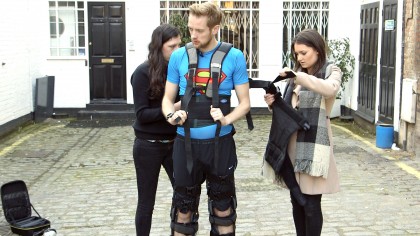
I'm petrified of getting old – I always have been. Maybe it's watching my grandparents suffer with arthritis badly since I was a child. Maybe the knowledge that older people in my family have various forms of the disease and it's possibly heading my way.
So when I was asked to try Ford's suit that uses technology to simulate the way your body feels and acts when you're 70-90 years old, I initially resisted – I didn't want to know what's coming.
But I was still in pretty high spirits when we wandered outside into the freezing cold to try the suit on – I'm in pretty good shape at the moment, so I was chirpily chatting while the Ford PRs strapped me up over 20 minutes
There was a foot weight, leg and arm braces, a back harness – all designed to stop my joints working properly, simulate muscle deterioration and create a stooped back.
On my head a brace restricted movement, headphones used to simulate loss of hearing and glasses used to create the effect of glaucoma – making everything a bit blurry and hard to see.
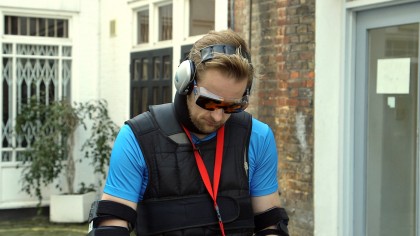
But the age suit has been tested by many already and everyone was obviously unified in saying that obviously it was terrible to wear, that being older brings physical issues that those without them struggle to really understand.
I was going to do something different: try it out running. I run every day at the moment as part of my marathon training plan, and while I didn't really want to find out how much harder it was going to get as the years pass, I felt too curious to throw away the chance.
So after being trussed up I ambled to the local park – and, to be honest, the walk wasn't that bad. I could see around the glaucoma, the hearing was only an issue when having a conversation and the rest of it felt more like a restrictive exoskeleton than my body reacting in a different way.
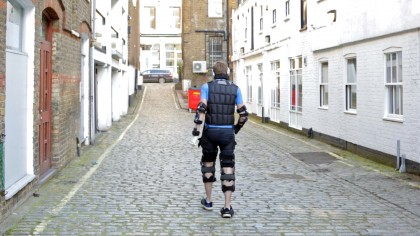
Then came the run. I was using the Garmin Forerunner 630 with a heart rate monitor to test, as I use that most days and have a pretty good understanding of how my pace and heart rate work together.
I took my first steps. They were actually OK – the foot weight was putting my balance off rather badly, but I felt able to correct that enough. My heart rate was fine – it was just a case of getting used to what range of motion I actually had.
After a few metres, it became clear there wasn't much of that, and my heart sank. If I wanted to push harder, I couldn't. My legs wouldn't extend hard enough to use my calf muscles properly. I couldn't swing my hips.
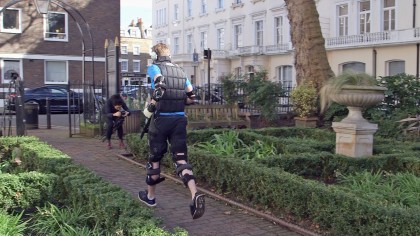
My shoulders were in agony from the hunch and trying to push upwards to maintain my centre of gravity, and all the while I was straining inside, trying to force the belief of speed from my mind into my non-functioning muscles.
I used to wonder what effect getting older would have on my running style – if it's anything like this, you're basically feeling like every limb is tethered to the middle of your body, and no matter how much effort you put in, it's not going to get any better.
I looked down at my watch. I'd done 200 metres and my heart rate was blowing up to 'steady' effort, which is usually around 4:30 minutes per kilometre. I was running at just under eight minutes per kilometre.
I tried to push harder. I couldn't. It led to a slight increase in speed, but a huge amount of extra effort as my legs and body tried to move further but were locked back in by pain and stiffness.
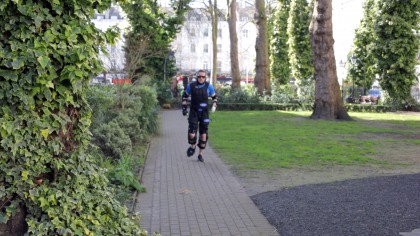
My breathing was now heavy and laboured, yet I was going much, much slower than normal – and I was torn between running harder or succumbing to the pain.
I eventually stopped after 400 metres, the sheer effort bringing me to a point I'd never felt before with running.
I didn't even know HOW to think about that experience – feeling pity for anyone that had to go through that felt patronising, as my overwhelming feeling was one of frustration, my body and mind desperate to break out of the restrictions and just start running freely again.
When I returned back to the office and stripped off the horrific apparatus, I phoned my Nan, who suffers with terrible arthritis in pretty much every joint. I'd always been sympathetic to her pain – as anyone would with a loved one – but I'd never asked her how things felt day to day.
The story made part of me wished I'd never asked. She told me how hard getting into bed was, then the nightly conundrum of whether to sleep on her 'bad' side and keep it warmer (but suffer heavy pain) or on the 'just aching' side but have to painfully move her joints around to find a comfortable position.
Or the pain in her knees that she described a 'fire'. Or that sometimes the pain was so sharp just moving about the house that she had to suppress tears. I suddenly felt terrible for being upset that the suit had rubbed a bit of my knee raw, and began mentally Googling every possible thing I could think of to help.
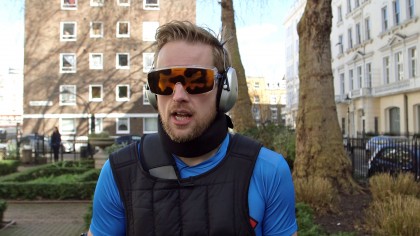
That's the level I thankfully couldn't experience – I was held back by faux stiffness, rather than pain that feels like it's penetrating into my bones, making every step a decision I don't want to make. To claim I have any kind of real insight into the life of someone fighting a disability just because I spent an hour wearing a painful suit simulation would be ridiculously incorrect.
I'm also desperately aware that writing this as an able-bodied person could sound horribly uncaring, like what can happen to our bodies as we get older is a gruesome sideshow – I promise you, my reaction was anything but that.
The whole experience has done nothing to make me feel better about the inevitable ageing process – I'm going to try to enjoy every step I take now, but I'll still know that demon is there lurking, ready to spread its spidery fingers through my joints and muscles and clawing me backwards.
Having to fight blistering pain to get a cup of tea just seems horrifically unfair, just because we've hung around on this earth for a bit.
I used to joke with my partner that I'll set a running world record for a 90 year old after watching an older chap swing his body around a track to do just that. Now, he's my new hero.
But this experience isn't about running. My constant feeling was one of the freedom to do what I want physically is going to be slowly pulled away, inching a little further each day until suddenly you realise it's miles away.
I can't do anything about the passage of time – but now that technology has allowed us to simulate the issues we'll face, maybe we'll all be a little bit more focused on how to solve them earlier, rather than having to watch a loved one suffer (or even have to feel the effects ourselves).
Sign up for breaking news, reviews, opinion, top tech deals, and more.

Gareth has been part of the consumer technology world in a career spanning three decades. He started life as a staff writer on the fledgling TechRadar, and has grew with the site (primarily as phones, tablets and wearables editor) until becoming Global Editor in Chief in 2018. Gareth has written over 4,000 articles for TechRadar, has contributed expert insight to a number of other publications, chaired panels on zeitgeist technologies, presented at the Gadget Show Live as well as representing the brand on TV and radio for multiple channels including Sky, BBC, ITV and Al-Jazeera. Passionate about fitness, he can bore anyone rigid about stress management, sleep tracking, heart rate variance as well as bemoaning something about the latest iPhone, Galaxy or OLED TV.